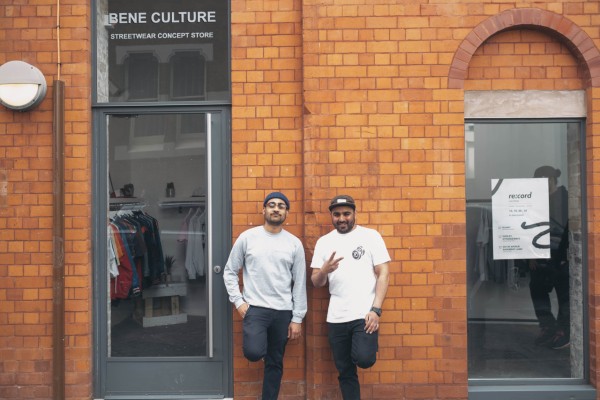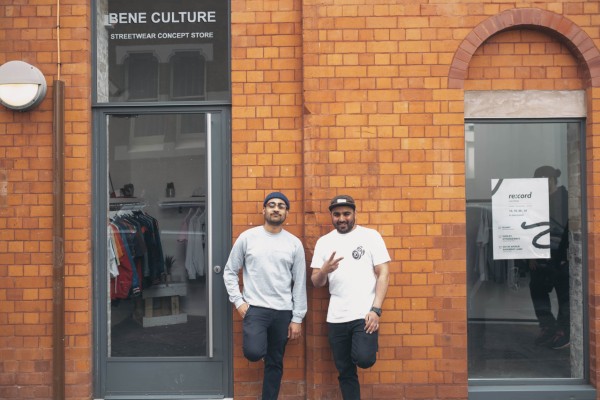

Nestled in the creative district of Digbeth, Birmingham’s Bene Culture is an independent retailer that has managed to put itself on the map as a leader of streetwear outside London.
Founded in 2015 as a concept store and inspired by the streetwear movement in the late 1990s and early 2000s, Bene Culture prides itself on providing a platform for community, culture and creatives – hosting events with local artists and housing independent brands as well as its own range.
“Whilst we have expanded the products within the store, I believe we are still a concept store,” Bene Culture managing director Hemal Chauhan told the Retail Gazette.
“We curate the store with extreme detail and our style/design is constantly changing.
“This is helped by being much more than a shopping experience by holding events, movie premiers, band performances and much more.”

After running the store online, Hemal, along with his brother Vimal and Hasim Jhina as co-founders, decided a physical store was needed as the “community aspect of the concept was extremely important”.
“We always knew Digbeth as the creative district within in Birmingham via its thriving art scene, skateboard culture and platform it provides for start-up companies,” Hemal said.
So how does Bene Culture differ from the masses of streetwear, trend based boutiques and brands appearing on social media and in pop up spaces?
“We aim to be more than a store in terms of the products and events we hold in our space,” Hemal explained.
“We like to invest in people and not just products”
From stocking unknown and new brands from around the world to providing freelance work to young and untested designers, Bene Culture aims to be the first store in the UK to stock new brands – especially ones that are limited and unique.
“We put heavy importance on the people behind the brands and ethos they build open,” Hemal added.
For Bene Culture’s own range of streetwear, the onus is on working with upcoming artists and graphic designers.
“With each drop, we don’t stick with one style or concept and we aim to be ever-changing,” Hemal explained.
“We produce everything in Birmingham with local printers and manufacturers to ensure we support our local area.”

The founders of Bene Culture all come from a British Indian background, so diversity within the space is paramount.
“We understand the issues facing discrimination and through various factors including your culture, skin colour, style and more,” Hemal reflected.
“Due to this, we try to make a platform that is open to diverse groups of people who can inter-connect and collaborate.”
It’s no secret that the retail climate has become increasingly difficult for independent retailers in recent years due to the rise of fast fashion chains. Himal put this down to customers preferring throwaway fashion on a cheap budget, thus making the market “extremely competitive”.
“You have to be more than a store.”
Despite this, Bene Culture still aims to be as sustainable as they can when it comes to producing their fashion ranges, and within a reasonable budget. The co-founder do this by making a majority of their items limited in quantity while stocking an array of vintage ranges.
Yet as fast fashion chains continue to dominate, independent retail is more important than ever.
“Independent stores don’t align with the normal connotations assigned with what a retail store should do,” Hemal said.
After almost four years in its retail space, Bene Culture has held over 40 events and collaborations ranging from food, art, and even a music gigs.
“Whilst it’s hard to pinpoint our favourites as we are incredibly blessed to have worked with a range of great individuals,” Hemal reflected.

Highlights include its dining club called Dollar Dim Sum Club back in 2016, a Paper Exhibition by London graphic designer Tim Head, and the Ballet Skate film premiere by Sumo Sportswear.
Overall, the best part of running Bene Culture for Himal has been the opportunity to work with “some of the most creative people in the UK and around the world”. In addition, one of his most memorable moments was the launch party.
“As we were online we were unsure if our audience via Depop and Instagram would transition to real space,” he recalled.
“Having those people in front of you was a very big moment for us.”
But the highlights don’t come without their fair share of challenges. Creating the collection for Bene Culture’s in-house label was one of these.
“With every drop, we want to ensure the products are fresh and speak to our customers,” Hemal said.
“Whilst we don’t like restocking products when we do we like making sure the imagery and concepts around the product are different.”
He added that while creating great products will always be a priority, he and his co-founders “want to ensure we are creating a great future for our customers and the community of creatives”.
“This is going to be accomplished by working with more artists, opening up different platforms for our community to thrive,” Hemal said.
Click here to sign up to Retail Gazette‘s free daily email newsletter

